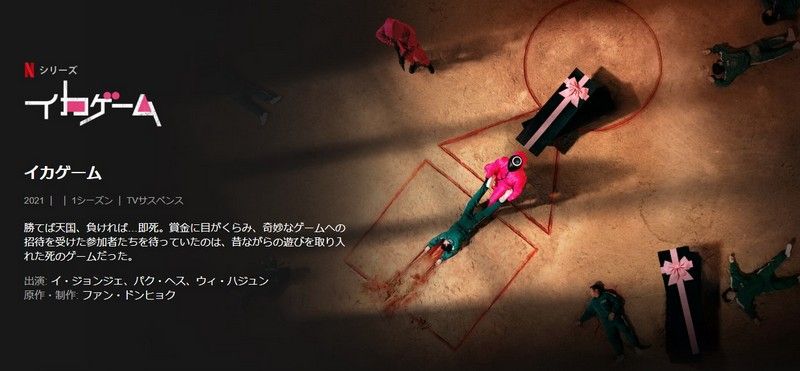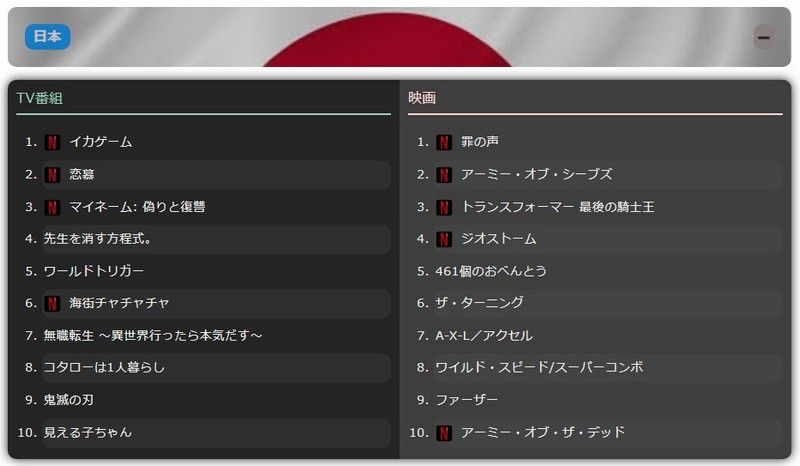The squid game is a global hit. How Japanese people reflect on themselves
For a while now, the most popular drama on the Netflix platform is "Squid Game". Not only many people in Japan have watched this drama, but it also ranks first in the ratings charts in more than 90 countries around the world.

Generally speaking, Japanese audiences have two major mainstream evaluations of this drama, one is very fond of it, and the other is scolding and criticizing. The reasons for liking it are basically the same as those of audiences in other countries. Friends who have watched "Squid Game" must understand. Friends who haven't watched this drama yet, I personally recommend it to come and watch it.
It is interesting to scrutinize the Japanese audience who criticized the drama, and to scrutinize the content of their criticism. The source of criticism mainly comes from plagiarism. In this country where plagiarism is regarded as a crime, plagiarism is an insult to the original creator (except for catering and other industries 🙄). What's more, plagiarized works can have higher popularity than plagiarized works, which is even more unforgivable. Another reason is also the reason for the expansion of criticism. "Squid Game" is a drama produced and performed by Koreans, which is also called a Korean drama. In the hearts of most Japanese people, there is a perception that Koreans have copied many things from Japan. Many Japanese viewers who have watched "Squid Game" have an intuitive reaction of copying us.
The Japanese works that are generally considered to be plagiarized include " Gambling Revelation カイジ" (Chinese translation: Gambling Apocalypse), " God さまの言うとおり" (Chinese translation: listen to the words of the gods), "バトル・ロワイアル" (Chinese translation: big escape). There may be many friends who have not seen these works, so I will briefly explain them.
Nobuyuki Fukumoto , the author of " Gambling Apocalypse " (Chinese translation: Gambling Apocalypse), started manga serialization in 1996. The protagonist, who is willing to degenerate and has a lot of borrowings, is caught by a mysterious organization and is induced to join a group of scumbags who are also heavily indebted to participate in the game of competing for large prizes. The protagonist uses his intelligence to break through the levels one by one.
" God さまの言うとおり" (Chinese translation: listen to the words of the gods) is a manga co-authored by Kaneshiro Soyuki and Fujimura Hiiji , which was serialized in 2011. Ordinary high school students were forced by a mysterious power that suddenly appeared on an ordinary school day to force the whole class to participate in the Japanese version of the Japanese version of One Two Three Wood Man (Japanese name: だるまさんがころんだ). Those who don't follow the instructions to play the game will be instantly killed. In addition to the game of one, two, three wooden men, there are other traditional Japanese games. The price of failure is death.
"バトル・ロワイアル" (Chinese translation: Battle Royale) is a novel written by Hiroharu Takami in 1999 in order to participate in the horror novel award. In a fictitious country, the third-grade middle school classes are randomly selected across the country and sent to the quarantine area, and they are asked to kill each other in a knockout match. In the end, only one person is allowed to survive. The government's ostensible reason is to use such measures to foster a sense of distrust among citizens and prevent citizens from rallying to form anti-government forces. In effect, senior government officials make bets on who will be the last survivor.
In addition to the original works, the above three works also have film and television works, as well as other extended works of different types. In Japan, comics and novels can be adapted into other forms of works, which means they have a certain popularity. However, it may not be well known outside of Japan.
In "Squid Game", I think you can find the shadow of the above works. Although it is not exactly the same, it is enough to make the audience who have seen it feel inexplicably familiar. In addition, the recent Korean plagiarism incident was widely reported by the Japanese media, that is, the improved strawberry varieties that Japan banned the export of seedlings actually appeared in Korean orchards. All these, many Koreans have a record of plagiarizing Japan, which makes the Japanese even more deeply impressed.
(For the case of South Korea's "salutation" to Japan, you can also refer to my previous articles. Personal website: Behind the scenes in JapanJapanese people like Hallyu but not Korea: side story 2 )
Although in the eyes of the Japanese, there are many traces of plagiarism in "Squid Game", but the screenwriter Huang Donghe obviously also made changes in line with South Korea's national conditions, as well as other points worthy of praise. For example, the set is gorgeous, the color contrast is strong, the plot is concise and lively, the rules of the game level are easy to understand, and it will not be too brain-burning, which is more suitable for the general public to watch.
Therefore, many Japanese people reflect on why their own country's dramas are inferior to Korean dramas in recent years, and they do not have the popularity and influence of Korean dramas in the global market.
In what ways are Japanese dramas inferior to Korean dramas? The script is not good, the acting skills of the actors are not good, the publicity is not strong enough, the filmmaking only pays attention to the preferences of domestic audiences, and does not consider the viewing experience of foreigners. These are the points of Japanese self-reflection, especially the lack of propaganda. The root cause is that Japan's domestic market is enough to support its own works, and if you can stay in a corner, you won't think about putting too much effort into the international market.
While introspecting, I am also envious of the South Korean government's great support and subsidy policy for cultural export. On the other hand, although the Japanese government proposed the "Cool Japan" policy many years ago, it has not achieved obvious results so far. Not only is the review strict, the scope of subsidies is limited, and the strength is also small. In the cases I have experienced, the application for English translation fees for cultural and creative works is time-consuming and laborious, and the actual allocation has been reduced by 20% or 20%, only more than 70% of the full amount.
Japanese people verbally dislike plagiarism of "Squid Game", but they are very honest in body. Since the film was released, the Japanese market has maintained the number one position for a long time, and Netflix's recent top 3 TV series are also Korean dramas.

I have read the report of the interview of the director/screenwriter Huang Donghe of "Squid Game". He said that he started to conceive the script of the play as early as 13 years ago (2008), but because of the special theme, he has not been able to find sponsors who agree with him in Korea. business, until Netflix invested in him to make a film in 2019 . When asked if he had referenced other works, he himself thought that there might be similarities with other works, but it should be just a coincidence. If you insist on who came up with these ideas first, he thinks he was the first...
According to him, before it was made public, the idea in his mind can be regarded as his own original knowledge and popularization, perhaps in the future lawyers will not have to worry about not having job opportunities in the future, and they will be able to make a living by helping people deal with these plagiarism cases.
2021/11/05 posted.
Original link toJapan behind-the-scenes observation
Like my work? Don't forget to support and clap, let me know that you are with me on the road of creation. Keep this enthusiasm together!

- Author
- More